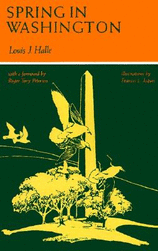 Esther Woolfson
Esther Woolfson's book on natural history,
Corvus is published by Granta in August, 2008. Her novel
Piano Angel is published by Two Ravens Press October 2008.
For the
Guardian, she named her top 10 birds in fact and fiction.
She writes: "The books I most enjoy that feature birds aren't necessarily the ones in which birds are at the forefront. In the factual ones they are. But in fiction I like a hint of birds: a bird as subsidiary character, as metaphor or symbol. I also like nature writing that places itself in historical context, and touches on the parallel lives of birds, and creatures, and man."
Number One on Woolfson's list:
Spring in Washington by Louis J Halle
Halle was an extraordinary man, a naturalist and a member of the Policy Planning Staff at the State Department. His books on birds are profound and informative. Spring in Washington, written about the spring of 1945, is an appreciation of the minutiae of life after the end of war, what Halle describes as "snatching the passing moment and examining it for signs of  eternity". Delightfully written, observant and wise, Halle places birds, his main preoccupation, magnificently in their settings.
eternity". Delightfully written, observant and wise, Halle places birds, his main preoccupation, magnificently in their settings.
"This again is fresh earth and fresh sky. Look up when you reach Washington's home at Mount Vernon and, like as not, you will see one or several American eagles soaring against the blue. They do duty for bronze eagles over Washington's tomb."
"Off East Potomac Park, two Bonaparte's gulls were flying away from me, flicking low over the water, showing the white flashes in their wings."
Reading this book makes me wonder what has changed in the natural landscape of Washington, what has been lost over the 60 odd years, what has diminished.
Read about
the other nine titles on Woolfson's list.
Visit
Esther Woolfson's website.
--Marshal Zeringue
 Andrew Ellson, Personal Finance Editor at the Times (London), named a critic's chart of books on "cash crashes."
Andrew Ellson, Personal Finance Editor at the Times (London), named a critic's chart of books on "cash crashes."


























